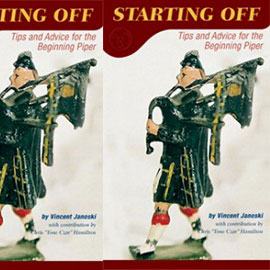Hacking the Bagpiping Judge Part II: Anyone Can Be a Bagpiping Judge
 Imagine, if you will, this scenario: Jack Lee suddenly has a change of life and must relocate from British Columbia, Canada to Boston, Massachusetts. What a boon for eastern U.S. piping! Unfortunately, that boon turns to a curse when we realize that Jack Lee is not able to judge EUSBPA sanctioned contests since he is not a member of the EUSPBA panel. As a matter of policy, Jack Lee could judge as a “guest” while a member of the British Columbia judges panel, but is no longer a member of that panel with his relocation. If he wants to adjudicate, he now must pass muster against the EUSPBA selection system—which requires him to be invited to take the EUSPBA judges exam.
Imagine, if you will, this scenario: Jack Lee suddenly has a change of life and must relocate from British Columbia, Canada to Boston, Massachusetts. What a boon for eastern U.S. piping! Unfortunately, that boon turns to a curse when we realize that Jack Lee is not able to judge EUSBPA sanctioned contests since he is not a member of the EUSPBA panel. As a matter of policy, Jack Lee could judge as a “guest” while a member of the British Columbia judges panel, but is no longer a member of that panel with his relocation. If he wants to adjudicate, he now must pass muster against the EUSPBA selection system—which requires him to be invited to take the EUSPBA judges exam.
Is there anyone who would argue that Jack Lee’s piping résumé alone would qualify him as a competent judge? Is a test really necessary to prove it? Such a special circumstance might cause the EUSPBA Music Board to waive the current requirements. It’s been done before. But how many times is it done before the requirements are cheapened and mean nothing?
What about another, lesser known piper with a résumé that does not quite measure up the same way to Jack Lee’s, but yet who has many years of experience in bands and is equally capable of judging a pipe band contest based on this experience? In our scenario, both this individual and Lee have relocated. Do you measure this individual against the EUSPBA requirements and force him or her to sit the exam while waiving the requirements for Lee? How do you justify that?
If the requirements in place are designed to ensure the EUSPBA judging panel has only the best pipers and drummers possible, then it must be applied equally to everyone as designed if the requirements are to achieve that goal. Any deviations from it and one could argue that the EUSPBA judges panel does not, in fact, have the best pipers and drummers possible.
As mentioned in Part I of this series, the current EUSPBA policy for selecting and certifying piping and drumming judges are so unrealistic that they must be waived in some way in almost every circumstance for any new judge considered for the panel in the last ten years. It essentially comes down to the decision of the few judges who sit on the EUSPBA Music Board at any given time to make those determinations.
What is apparent is that the “résumé” of the prospective candidate, his or her history and accomplishments as a player and/or a teacher, is considered important when making the determination to “fudge” the judge selection requirements. If the requirements are so malleable, and the résumé so important, then why not do away with the requirements for selection and certification altogether and rely instead on a system focused squarely on a candidate’s résumé? Such an approach would almost guarantee that the only the best, most accomplished pipers and drummers are certified to adjudicate competitions. An individual’s real world experience and achievements are given the weight they deserve rather than an individual’s ability to write or regurgitate music. No lengthy exam required.
Naturally, all achievements in solo bagpiping, pipe band, and drumming competitions are not the same. The Northern Meeting is not the same class of event as the USPF. Someone may be an excellent player and do very well in eastern US competition but may never set foot outside the region. Likewise, a significant achievement fifteen years ago is not equal to the same achievement last year. What is needed is a system that “scores” achievements as a player and a teacher taking into account the significance of the achievement and the number of years over which those achievements are gained as well as the total number of years of activity and experience. Instead of selecting judges based on the scoring of an exam, judges would be selected based on a scoring of their existing piping résumé.
With such a system in place, practically anyone could become a piping or drumming judge—provided they had the achievements and real world activity and experience to score high enough. Jack Lee would become a member of the EUSPBA judging panel easily. The other individual in our hypothetical relocation scenario would also become certified as an EUSPBA judge, but would be allowed to judge piping and ensemble in pipe bands only. Perhaps another individual’s résumé would only score high enough to judge solo piping in the lower grade levels, or perhaps only light music and not piobaireachd. Since the number of years of activity and experience are taken into account under such a system, past achievements will weigh differently toward an individual’s “score” over time unless that individual remains active and continues raking up more achievements.
Such a system would add depth to an EUSPBA judges panel that, as reviewed earlier, is static and myopic. Becoming a piping or drumming judge would be accessible to everyone, not just those performing at the top levels of competition. Obviously, your score would fare better with experience at the upper levels of play than with achievements at lower levels, but that is the dynamic of an open system. Open markets work best when they are large, deep, diverse, and accessible. Bagpiping is no different. Making the EUSPBA judges panel accessible to all with applicable and diverse real world experience at any level would benefit competitor and judge alike.
Our eastern US piping and drumming scene reflects a singular point of view that narrows the opportunities for competitive success. With a changed system that brings an influx of new judges reflecting infinite viewpoints, the possibility of success in piping and drumming competition will become infinite as well. Expanded points of view will enrich the experience of piping and drumming competition overall and maybe, just maybe, do so much more to make us all better players in the end.
How does that happen? Stay tuned for Hacking the Bagpiping Judge Part III: How You Can Be a Piping Judge—The System Explained
 Pipehacker
Pipehacker








